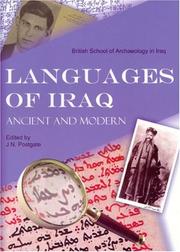| Listing 1 - 6 of 6 |
Sort by
|
Book
ISBN: 344704019X Year: 1998 Publisher: Wiesbaden Harrassowitz
Abstract | Keywords | Export | Availability | Bookmark
 Loading...
Loading...Choose an application
- Reference Manager
- EndNote
- RefWorks (Direct export to RefWorks)
Book
Year: 1976 Publisher: Napoli : Istituto universitario orientale,
Abstract | Keywords | Export | Availability | Bookmark
 Loading...
Loading...Choose an application
- Reference Manager
- EndNote
- RefWorks (Direct export to RefWorks)
Turkmen language --- Accents and accentuation. --- Intonation.
Book
ISBN: 2747526836 Year: 2002 Publisher: Paris : Harmattan,
Abstract | Keywords | Export | Availability | Bookmark
 Loading...
Loading...Choose an application
- Reference Manager
- EndNote
- RefWorks (Direct export to RefWorks)
Turkmen language --- Turkmène (Langue) --- Textbooks for foreign speakers --- French --- Manuels pour francophones --- Turkmène (Langue)
Book
Year: 1976 Volume: 2/9 3 Publisher: Napoli : Istituto universitario orientale,
Abstract | Keywords | Export | Availability | Bookmark
 Loading...
Loading...Choose an application
- Reference Manager
- EndNote
- RefWorks (Direct export to RefWorks)
Turkmen language --- Turkic languages --- Turkmène (Langue) --- Langues turques --- Accents and accentuation --- Intonation --- Prosodic analysis --- Accents et accentuation --- Analyse prosodique

ISBN: 9780903472210 090347221X Year: 2007 Publisher: Cambridge: Cambridge university press,
Abstract | Keywords | Export | Availability | Bookmark
 Loading...
Loading...Choose an application
- Reference Manager
- EndNote
- RefWorks (Direct export to RefWorks)
Semitic languages --- Sumerian language --- Akkadian language --- Aramaic language --- Arabic language --- Kurdish language --- Langues sémitiques --- Sumérien (Langue) --- Akkadien (Langue) --- Araméen (Langue) --- Arabe (Langue) --- Kurde (Langue) --- History --- Congresses. --- Histoire --- Congrès --- Iraq --- Irak --- Languages --- Congresses --- Langues --- Turkmen language --- Dialects --- Langues sémitiques --- Sumérien (Langue) --- Araméen (Langue) --- Congrès --- History. --- Semitic languages - History - Congresses --- Sumerian language - Congresses --- Akkadian language - Congresses --- Aramaic language - Congresses --- Arabic language - Congresses --- Kurdish language - Congresses --- Turkmen language - Dialects - Iraq - Congresses --- Iraq - Languages - Congresses --- Akkadien (langue) --- Hourrite (langue) --- Araméen (langue) --- Arabe (langue) --- Kurde (langue) --- Turkmène (langue)
Book
ISBN: 0822986108 9780822986102 9780822964636 0822964635 Year: 2018 Publisher: Pittsburgh, Pa.
Abstract | Keywords | Export | Availability | Bookmark
 Loading...
Loading...Choose an application
- Reference Manager
- EndNote
- RefWorks (Direct export to RefWorks)
Learning to Become Turkmen examines the ways in which the iconography of everyday life--in dramatically different alphabets, multiple languages, and shifting education policies--reflects the evolution of Turkmen society in Central Asia over the past century. As Victoria Clement shows, the formal structures of the Russian imperial state did not affect Turkmen cultural formations nearly as much as Russian language and Cyrillic script. Their departure was also as transformative to Turkmen politics and society as their arrival. Complemented by extensive fieldwork, Learning to Become Turkmen is the first book in a Western language to draw on Turkmen archives, as it explores how Eurasia has been shaped historically. Revealing particular ways that Central Asians relate to the rest of the world, this study traces how Turkmen consciously used language and pedagogy to position themselves within global communities such as the Russian/Soviet Empire, the Turkic cultural continuum, and the greater Muslim world.
Russian language --- Turkmen language --- Language policy --- Turkmen --- Language and education --- Educational linguistics --- Education --- Language and languages --- Akhal Tekke-Turkomans --- Salor-Turkomans --- Sarik-Turkomans --- Tekke-Turkomans --- Turcomans --- Turkmens --- Turkomans --- Ethnology --- Turkic peoples --- Glottopolitics --- Institutional linguistics --- Language and state --- Languages, National --- Languages, Official --- National languages --- Official languages --- State and language --- Communication policy --- Language planning --- Turkman language --- Turkoman language --- Turkic languages --- Turkic languages, Southwest --- Slavic languages, Eastern --- History --- Political aspects --- History. --- Social aspects --- Government policy --- Turkmenistan. --- Republic of Turkmenistan --- Respublika Turkmenistan --- Torukumenisutan --- Tukumansitan --- Turcomenistão --- Turkmanistān --- Türkmenisztán --- Turkmenostan Respublikasy --- T'urŭk'ŭmenisŭt'an
| Listing 1 - 6 of 6 |
Sort by
|

 Search
Search Feedback
Feedback About UniCat
About UniCat  Help
Help News
News